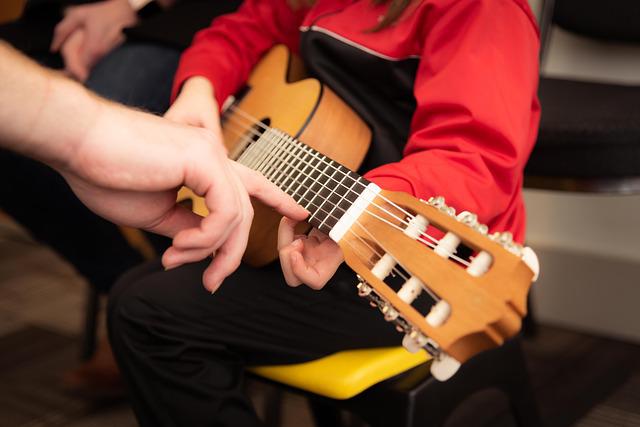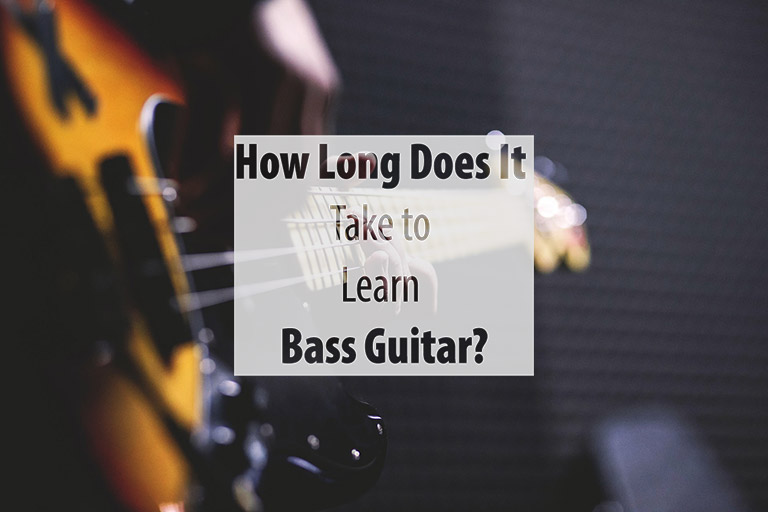The one thing that comes to our mind when we decide to learn a new instrument (or anything for that matter) is: how long would it take to learn this?
This is very normal for someone starting with a bass guitar, but some people get too attached to it, which hinders their progress rather than helping them stay focused. In general, every craft and every instrument takes time, practice, and dedication to learn. This article gives a general guideline on how you might expect your progress along the journey of learning and playing the bass guitar.
So, how long would it take to learn bass guitar? The short answer is:
You can expect to be comfortable playing the bass guitar in about 6-8 months when practiced regularly. Of course, it would depend on factors like age, music experience, dedication, and to a certain extent, your innate talent, which we will look into more deeply in this article.
I also firmly believe in the 10000-hour-rule study, which says it takes around 10000 hours of practice to master anything. So going by this rule, it would take a little less than ten years to fully master a bass guitar with 3 hours of practice every day.
It would take 9 years exactly but nobody is perfect therefore we have accounted for some days when you feel lazy.
If you’re reading this article, I’m sure mastery is not something you’re looking for to start with. As with learning anything, it is best to set short-term goals and go after them.
The general idea of this article is to lead you to be able to set realistic goals according to your abilities. And provide a generalized timeline that points out what you can expect to achieve along your journey so that you can be comfortable practicing and learning bass guitar and not get discouraged.
But, do understand that there is no precise answer to the question. The most crucial factor would be perseverance — the fact that you do not give up.
Remember, practice makes perfect!
Factors That Decide How Long It Takes to Learn Bass Guitar
Age

Many studies show that age does play a role in how we process and store knowledge in our grey matter. Children do have an advantage over adults when it comes to learning new things. But, we are mentioning this not to deter you if you’re older. Many pieces of research show that learning a new craft can benefit cognitive and motor capabilities.
You can always counter that advantage kids have with hard work, perseverance, and patience. You’re never too old to learn bass guitar!
Prior Experience in Music
It would certainly give you a head start in learning bass if you already know how to play the guitar or (to some extent) any other stringed instrument — that is a fact.
Though the bass is a different instrument requiring different techniques, knowing how to play the guitar, for example, would help you initially with learning the bass. Basic techniques like fretting and plucking are very similar, and your finger dexterity and muscle memory would make you feel quite at home.
However, this is not to say that every master guitar player would automatically be a great bass player, as there is quite a difference between how the bass and a guitar are played.
It’d also be helpful if you have basic knowledge of music theory or just music in general.
Dedication
If I had to pick one factor that I believe would be a deciding factor in learning a bass guitar, it would be dedication. Whether you are learning bass guitar by yourself or a teacher, you must invest time in practice. There are no two ways about it.
Remember, you will not always be fully motivated, which is when dedication comes to play. It is okay to take a day or two off, but continued practice with dedication is what will ultimately decide how quickly you can learn bass guitar.
Two to three hours of practice every day for a few months will take you ahead of someone with talent and knowledge but who won’t practice properly.
Talent
Even though discouraging to hear, it is wise to understand that some people have musical talent. They have a disposition for music and have a natural ability to pick things up quickly. They may also have a naturally great ear for music.
So, with great talent, they would probably learn bass guitar or any other instrument faster and generally have a head start. On the other hand, almost all the qualities they have more of inherently can be learned with practice, time and dedication. It would just take more time. Also, having musical talent doesn’t guarantee anything. People with great talent need dedication and practice, like all of us regular people.
Remember the saying: “Hard work beats talent when talent doesn’t work hard.”
Tips to Make Learning Bass Guitar Easier
The following tips would help most people to go on about their bass guitar learning journey in a more optimal manner. Do remember these are guidelines and not hard rules. Everybody is different. See what suits you better — what needs more of your attention and what needs less.
Learn the Basics
Learning music theory is something that many people think of as a chore; however, the fundamental knowledge of this can speed up how quickly you can learn the bass guitar. Remember, our goal is to become a better bassist (and, by extension, musician), not a purist in music theory.
If this is how you see learning music theory, it’d feel like a stepping stone to becoming decent at playing the bass guitar in a short time. Jumping straight into learning tabs and songs would give some instant gratification but is not recommended.
Using Root and Fifths
Root and fifths is the most common note pattern used extensively by bass players, irrespective of the genre. Most people find that learning the root and fifth note pattern first helps them with the basics of playing a bassline. Furthermore, many popular songs have basslines that mostly use these, and they sound melodic and pleasing and are also not too difficult to play.
Remember Your Role
The bass guitar being part of the bassline, is supposed to be played along with the drummer in the rhythm section. Bass guitarists are not the center of attention like the lead guitarists, who sometimes go off on their own during the solo parts.
Therefore, playing in sync with the other band members is one of the needed qualities of a bassist. It would be a massive help for you as a beginner to be able to play in a band after a few months of practice. Practicing with a band, especially a drummer, would improve your synchronization and timing.
Have a Mentor
Having a tutor or mentor teach you is undoubtedly going to have a significant impact on how quickly you learn. However, this is the most expensive way as well. Joining an amateur band (like we discussed above) can also be a great way of getting input from other like-minded and music-oriented people.
In recent times, however, having YouTube and other online teaching methods at your disposal (both free and paid) has made seeking a tutor a thing of the past as more and more people are getting self-taught. Still, having a mentor, tutor, or anyone proficient in music will impact your bass learning journey. You’ll need the constructive criticism of a third person to grow. Whether they are your tutor, friend, or a senior band member doesn’t matter.
Take Bass Lessons
Usually, the first place most people search for when trying to learn anything new is YouTube. There is an abundance of great information and helpful videos on YouTube to learn bass guitar.
To start with, you should try to find a channel with course-style videos that start from the basics and take you through the journey of learning bass guitar.
Somewhere along the line, you might find the need to join a paid course. However, many self-taught people have never taken a formal course and are good at playing bass by being consistent and dedicated.
Be Patient
Learning anything worthwhile takes time. Rushing things and being impatient would, more often than not, be counterproductive. Please do not underestimate your abilities, but at the same time, don’t overestimate them either.
At the end of the day, there are a lot of factors beyond your control. So, try to focus on things that are, in fact, in your control, like dedication and patience. It is no use constantly worrying about whether you’re getting better or not. You’ll get where you want to be if you love bass guitars and can practice regularly with dedication.
Have Fun

Practicing for hours on end can get monotonous (excuse the pun). Therefore, it is essential that you have fun along your journey. Be passionate about it — learn and have fun!
Bass Guitar Progress Timeline
The following timeline should help you keep your progress on track without getting overwhelmed or frustrated. The prerequisite is 3 hours of solid practice every day. Do remember these timelines are just an educated guess for an average person. Everybody is different and will reach different levels at different time-frame.
- 6 Months — Beginner Level
- 12 Months — Advanced Beginner Level
- 2-6 Years — Intermediate Level
- 6-8 Years — Advanced Level
- 10 Years — Master Level (the 10,000-hour rule)
- 10 Years-and-beyond — Still a learner

Related Questions
How Long Does It Take to Be Decent at Bass?
Let’s first define “decent” — it is when you’re at an intermediate level and can play various songs. At this level, you’ll be able to join a band or take paid gigs.
I think most people would be able to reach the intermediate level in around 2 to 2.5 years with 2-3 hours of practice every day.
That being said, if your definition of “decent” is when you’ve got the basics down and are able to read tabs and play along with the drummer, then I’d say maybe 6-8 months, again with 2-3 hours of daily practice. At this level, you’ll be able to play at least some songs at a decent level.
Can Anyone Learn How to Play the Bass Guitar?
Yes, anyone with enough motivation, passion, and dedication will be able to learn the bass guitar.
How Long Does It Take to Learn Bass Guitar by Yourself?
All the timelines mentioned here in this article are for self-taught people.
How Long Does It Take to Learn a Song on Bass Guitar?
You’ll likely be able to play your first song (which doesn’t have a complicated bassline) within a few weeks or even days.
Is Bass Easier than a Guitar?
Please see this article for an in-depth comparison.
Final Thoughts
How long it takes to learn bass guitar is going to be different for each person. Hopefully, the factors discussed in this article will help you have an idea of what to expect along your bass guitar learning journey. The tips discussed should also streamline your path to success and may help you get the optimum benefits out of your practice. Finally, I wish you all the best in your bass guitar journey!


